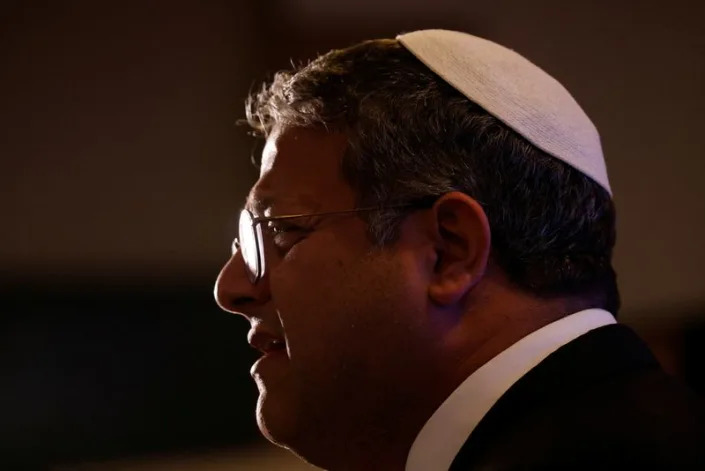
Israeli far-right lawmaker Itamar Ben-Gvir holds a news conference ahead of Israel's election, in Jerusalem
Wed, November 2, 2022
By Dan Williams
JERUSALEM (Reuters) - Israeli far-right politician Itamar Ben-Gvir, who for years was seen as too much of a firebrand for mainstream politics, swept up votes in Tuesday's election and may now play kingmaker in Benjamin Netanyahu's stunning political comeback.
With a preliminary tally giving Ben-Gvir's Religious Zionism party third place, the ultranationlist is set for a central role in shaping a new government led by Netanyahu, whose terms in top office spanned a quarter-century and ended some 18 months ago.
It marks a dramatic transformation for Ben-Gvir, who was convicted in 2007 of racist incitement against Arabs and support for Kach, a group on the Israeli and U.S. terror blacklists.
That background once locked him out of Israeli politics but his success at the ballot box reflects a hawkish swing among the electorate after his own image makeover, prompting Netanyahu to say he was ready to deal with a man he previously spurned.
"I promise those who didn't vote for me, from parties far away on the spectrum, that we are brothers," 46-year-old Ben-Gvir said in a victory speech that was punctuated by chants from the audience of his slogan: "Death to Terrorists!"
In government, however, Ben-Gvir - who wants to be police minister - would further envenom Israel's standoff with the Palestinians and strain Jewish-Arab relations inside Israel.
His presence could also test Israel's bedrock ties with the United States and the American Jewish community, who tend to be more left-leaning.
"Look at Ben Gvir's history, his actions, his statements. This is not someone we want to see as part of the government," conservative Israel Hayom newspaper quoted an unnamed official in U.S. President Joe Biden's administration as saying in an article published on Sept. 29.
The U.S. State Department did not respond to a Reuters query, sent before the election, on whether it was concerned that Ben-Gvir might have a role in the next Israeli coalition.
Netanyahu has brushed off the prospect of such blowback from Washington, telling Israel's Channel 14 TV on Oct. 26: "So let them voice their opinion. It has no sway over me."
Burly and bespectacled, Ben-Gvir has for decades engaged in raging arguments with Arabs and liberals on curbsides or in the Knesset. He has now lowered the volume. The yellow trappings of Israeli supremacist groups was banished from his campaign, replaced by the national colours, blue and white.
He says he no longer advocates expulsion of all Palestinians - just of those he deems traitors or terrorists. That, he adds, should include Jews disloyal to the country. He also champions capital punishment and looser open-fire regulations for troops.
A settler on the West Bank which Israel captured and occupied in 1967, Ben-Gvir wants the Palestinian Authority, which has governed parts of the territory under interim peace deals, dismantled. That would place West Bank Palestinians back under full Israeli control.
He used to heckle Gay Pride parades as "abominations". Now he says he would accept it if one of his six children were gay. He insists, however, that marriages in Israel should be kept subordinate to orthodox religion strictures.
Ben-Gvir did not serve in the military at age 18 - normally a major electoral impediment. He says he was denied the draft for political reasons. His parliamentary list includes a retired army general, and he has made headlines in Israel by brandishing a pistol during confrontations with Palestinians.
The Anti-Defamation League, a New York-based advocacy group, said before the election about Ben-Gvir's prospective coalition role: "We believe such a development would be corrosive to Israel's founding principles, and its standing among its strongest supporters."
As Israel's far right parties celebrate, Palestinians shrug





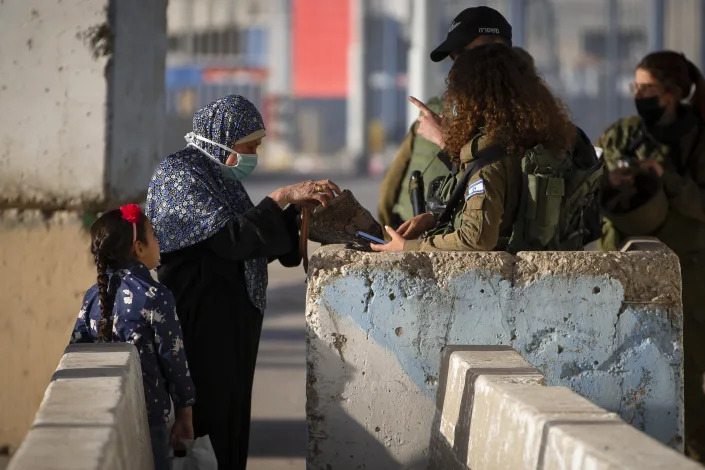



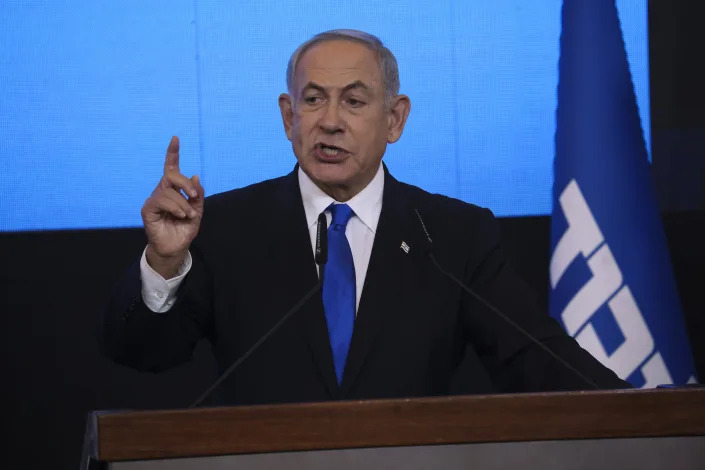


Israeli far-right lawmaker and the head of "Jewish Power" party, Itamar Ben-Gvir, gestures after first exit poll results for the Israeli Parliamentary election at his party's headquarters in Jerusalem, Wednesday, Nov. 2, 2022. News of the apparent comeback of former Prime Minister Benjamin Netanyahu and the dramatic rise of his far-right and ultra-Orthodox allies has elicited little more than a shrug among many Palestinians.
(AP Photo/Oren Ziv, File)
ISABEL DEBRE
Thu, November 3, 2022
RAMALLAH, West Bank (AP) — The apparent comeback of former Prime Minister Benjamin Netanyahu and the dramatic rise of his far-right and ultra-Orthodox allies in Israel's general election this week have prompted little more than shrugs from many Palestinians.
“It's all the same to me,” Said Issawiy, a vendor hawking nectarines in the main al-Manara Square of Ramallah, said of Netanyahu replacing centrist Yair Lapid and poised to head the most right-wing government in Israel's history.
Over the past month, Issawiy had struggled to get to work in Ramallah from his home in the city of Nablus after the Israeli army blocked several roads in response to a wave of violence in the northern West Bank. “I'm just trying to eat and work and bring something back to my kids," he said.
Some view the likely victory for Netanyahu and his openly anti-Palestinian allies, including ultranationalist lawmaker Itamar Ben-Gvir who wants to end Palestinian autonomy in parts of the occupied West Bank, as a new blow to the Palestinian national project.
The sharp rightward shift of Israel’s political establishment pushes long-dormant peace negotiations even further out of reach and deepens the challenges facing 87-year-old President Mahmoud Abbas, whose autocratic Palestinian Authority already seemed to many Palestinians as little more than an arm of the Israeli security forces.
“If you want to use the metaphor of a ‘nail in the coffin of the Palestinian Authority,’ that was done earlier,” said Ghassan Khatib, a former Palestinian peace negotiator and Cabinet minister. “This election is another step in that same direction.”
During his 12 years in power, before being voted out in 2021, Netanyahu showed scant interest in engaging with the Palestinians. Under his leadership, Israel vastly expanded its population of West Bank settlers — now some 500,000 — and retroactively legalized settler outposts built on private Palestinian land. The measures have entrenched Israel's occupation, now in its 56th year since Israel captured the territory during the 1967 Mideast war.
Palestinians see successive Israeli governments as seeking to solidify a bleak status quo in the West Bank: Palestinian enclaves divided by growing Israeli settlements and surrounded by Israeli forces.
“We had no illusion that this next government would be a partner for peace,” said Ahmad Majdalani, a minister in the Palestinian Authority. "It’s the opposite, we see a campaign of incitement that began more than 15 years ago as Israel drifted toward extremism.”
The Gaza Strip’s militant Hamas rulers said the election outcome would “not change the nature of the conflict.”
But for the first time, surging support for Israel’s far right has made the Jewish supremacist party of Ben-Gvir the third-largest in the Israeli parliament.
Ben-Gvir and his allies hope to grant immunity to Israeli soldiers who shoot at Palestinians, deport rival lawmakers and impose the death penalty on Palestinians convicted of attacks on Jews. Ben-Gvir is the disciple of a racist rabbi, Meir Kahane, who was banned from parliament and whose Kach party was branded a terrorist group by the United States before he was assassinated in New York in 1990.
On the campaign trail, Ben-Gvir grabbed headlines for his anti-Palestinian speeches and stunts — recently brandishing a pistol and encouraging police to open fire on Palestinian stone-throwers in a tense Jerusalem neighborhood.
Some Palestinians have found reason for optimism. After Tuesday’s elections, they say, Israel will no longer present to the world the telegenic face of Lapid. A win for extremism in Israel, some say, could bolster the moral case for efforts to isolate Israel, vindicating activism outside the moribund peace process.
“It will lead to some international pressure,” said Mahmoud Nawajaa, an activist with the Boycott, Divestment and Sanctions movement, or BDS, which calls for an economic boycott of Israel as happened to apartheid-era South Africa in the 1980s.
“Netanyahu is more honest and clear about his intentions to expand settlements. The others didn’t say it, even if it was happening,” Nawajaa added.
Lapid and his predecessor, Naftali Bennett, a former settler leader who rebranded himself as a national unifier, had presided over a wobbly coalition of right-wing, centrist and dovish left-wing parties, including the first Arab party to ever join a government.
Foreign leaders who shunned the divisive Netanyahu embraced what appeared to be a less ideological government. Bennett became the first Israeli leader to visit the United Arab Emirates after the countries normalized ties — an honor repeatedly denied to Netanyahu. President Joe Biden, who had a rocky relationship with Netanyahu, basked in Lapid’s warm welcome during his visit to Israel last summer.
But even as Lapid voiced support for the two-state solution during his address to the U.N. General Assembly in September, Palestinians saw no sign he could turn words into action. They watched Israel approve thousands of new settler homes on lands they want for a future state.
Israeli military raids in the West Bank have also surged after a series of Palestinian attacks in the spring killed 19 people in Israel. More than 130 Palestinians have been killed, making 2022 the deadliest since the U.N. started tracking fatalities in 2005. The Israeli army says most of the Palestinians killed have been militants. But stone-throwing youths protesting the incursions and others not involved in confrontations have also been killed.
Even as final ballots were still being counted from the election, violence flared up with four Palestinians killed in separate incidents on Thursday.
“In terms of violence, the Lapid government has outdone itself,” said Nour Odeh, a Palestinian political analyst and former PA spokeswoman. “As far as new settlements and de facto annexation, Lapid is Netanyahu.”
Many young Palestinians have given up on the two-state solution and grown disillusioned with the aging Palestinian leadership, which they see as a vehicle for corruption and collaboration with Israel. Hamas and Fatah, the Palestinian party that controls the West Bank, have remained bitterly divided for 15 years.
A mere 37% of Palestinians support the two-state solution, according to the most recent report from Palestinian pollster Khalil Shikaki. In Israel the figures are roughly the same — 32% of Jewish Israelis support the idea, according to the Israel Democracy Institute.
“There is no horizon for a political track with the Israelis,” Odeh said. “We need to look inward ... to re-legitimize our institutions through elections, and stand together on a united political platform.”
But on the crowded, chaotic streets of Ramallah on Wednesday, there was only misery and anger over the daily humiliations of the occupation.
“I hate this place," said Lynn Anwar Hafi, a 19-year-old majoring in literature at a local university. “It’s like the occupation lives inside me. I can’t think what I want to. I can’t go where I want to. I won’t be free until I leave.”
Analysis-As Netanyahu returns, concerns grow over far-right ally
ISABEL DEBRE
Thu, November 3, 2022
RAMALLAH, West Bank (AP) — The apparent comeback of former Prime Minister Benjamin Netanyahu and the dramatic rise of his far-right and ultra-Orthodox allies in Israel's general election this week have prompted little more than shrugs from many Palestinians.
“It's all the same to me,” Said Issawiy, a vendor hawking nectarines in the main al-Manara Square of Ramallah, said of Netanyahu replacing centrist Yair Lapid and poised to head the most right-wing government in Israel's history.
Over the past month, Issawiy had struggled to get to work in Ramallah from his home in the city of Nablus after the Israeli army blocked several roads in response to a wave of violence in the northern West Bank. “I'm just trying to eat and work and bring something back to my kids," he said.
Some view the likely victory for Netanyahu and his openly anti-Palestinian allies, including ultranationalist lawmaker Itamar Ben-Gvir who wants to end Palestinian autonomy in parts of the occupied West Bank, as a new blow to the Palestinian national project.
The sharp rightward shift of Israel’s political establishment pushes long-dormant peace negotiations even further out of reach and deepens the challenges facing 87-year-old President Mahmoud Abbas, whose autocratic Palestinian Authority already seemed to many Palestinians as little more than an arm of the Israeli security forces.
“If you want to use the metaphor of a ‘nail in the coffin of the Palestinian Authority,’ that was done earlier,” said Ghassan Khatib, a former Palestinian peace negotiator and Cabinet minister. “This election is another step in that same direction.”
During his 12 years in power, before being voted out in 2021, Netanyahu showed scant interest in engaging with the Palestinians. Under his leadership, Israel vastly expanded its population of West Bank settlers — now some 500,000 — and retroactively legalized settler outposts built on private Palestinian land. The measures have entrenched Israel's occupation, now in its 56th year since Israel captured the territory during the 1967 Mideast war.
Palestinians see successive Israeli governments as seeking to solidify a bleak status quo in the West Bank: Palestinian enclaves divided by growing Israeli settlements and surrounded by Israeli forces.
“We had no illusion that this next government would be a partner for peace,” said Ahmad Majdalani, a minister in the Palestinian Authority. "It’s the opposite, we see a campaign of incitement that began more than 15 years ago as Israel drifted toward extremism.”
The Gaza Strip’s militant Hamas rulers said the election outcome would “not change the nature of the conflict.”
But for the first time, surging support for Israel’s far right has made the Jewish supremacist party of Ben-Gvir the third-largest in the Israeli parliament.
Ben-Gvir and his allies hope to grant immunity to Israeli soldiers who shoot at Palestinians, deport rival lawmakers and impose the death penalty on Palestinians convicted of attacks on Jews. Ben-Gvir is the disciple of a racist rabbi, Meir Kahane, who was banned from parliament and whose Kach party was branded a terrorist group by the United States before he was assassinated in New York in 1990.
On the campaign trail, Ben-Gvir grabbed headlines for his anti-Palestinian speeches and stunts — recently brandishing a pistol and encouraging police to open fire on Palestinian stone-throwers in a tense Jerusalem neighborhood.
Some Palestinians have found reason for optimism. After Tuesday’s elections, they say, Israel will no longer present to the world the telegenic face of Lapid. A win for extremism in Israel, some say, could bolster the moral case for efforts to isolate Israel, vindicating activism outside the moribund peace process.
“It will lead to some international pressure,” said Mahmoud Nawajaa, an activist with the Boycott, Divestment and Sanctions movement, or BDS, which calls for an economic boycott of Israel as happened to apartheid-era South Africa in the 1980s.
“Netanyahu is more honest and clear about his intentions to expand settlements. The others didn’t say it, even if it was happening,” Nawajaa added.
Lapid and his predecessor, Naftali Bennett, a former settler leader who rebranded himself as a national unifier, had presided over a wobbly coalition of right-wing, centrist and dovish left-wing parties, including the first Arab party to ever join a government.
Foreign leaders who shunned the divisive Netanyahu embraced what appeared to be a less ideological government. Bennett became the first Israeli leader to visit the United Arab Emirates after the countries normalized ties — an honor repeatedly denied to Netanyahu. President Joe Biden, who had a rocky relationship with Netanyahu, basked in Lapid’s warm welcome during his visit to Israel last summer.
But even as Lapid voiced support for the two-state solution during his address to the U.N. General Assembly in September, Palestinians saw no sign he could turn words into action. They watched Israel approve thousands of new settler homes on lands they want for a future state.
Israeli military raids in the West Bank have also surged after a series of Palestinian attacks in the spring killed 19 people in Israel. More than 130 Palestinians have been killed, making 2022 the deadliest since the U.N. started tracking fatalities in 2005. The Israeli army says most of the Palestinians killed have been militants. But stone-throwing youths protesting the incursions and others not involved in confrontations have also been killed.
Even as final ballots were still being counted from the election, violence flared up with four Palestinians killed in separate incidents on Thursday.
“In terms of violence, the Lapid government has outdone itself,” said Nour Odeh, a Palestinian political analyst and former PA spokeswoman. “As far as new settlements and de facto annexation, Lapid is Netanyahu.”
Many young Palestinians have given up on the two-state solution and grown disillusioned with the aging Palestinian leadership, which they see as a vehicle for corruption and collaboration with Israel. Hamas and Fatah, the Palestinian party that controls the West Bank, have remained bitterly divided for 15 years.
A mere 37% of Palestinians support the two-state solution, according to the most recent report from Palestinian pollster Khalil Shikaki. In Israel the figures are roughly the same — 32% of Jewish Israelis support the idea, according to the Israel Democracy Institute.
“There is no horizon for a political track with the Israelis,” Odeh said. “We need to look inward ... to re-legitimize our institutions through elections, and stand together on a united political platform.”
But on the crowded, chaotic streets of Ramallah on Wednesday, there was only misery and anger over the daily humiliations of the occupation.
“I hate this place," said Lynn Anwar Hafi, a 19-year-old majoring in literature at a local university. “It’s like the occupation lives inside me. I can’t think what I want to. I can’t go where I want to. I won’t be free until I leave.”
Analysis-As Netanyahu returns, concerns grow over far-right ally
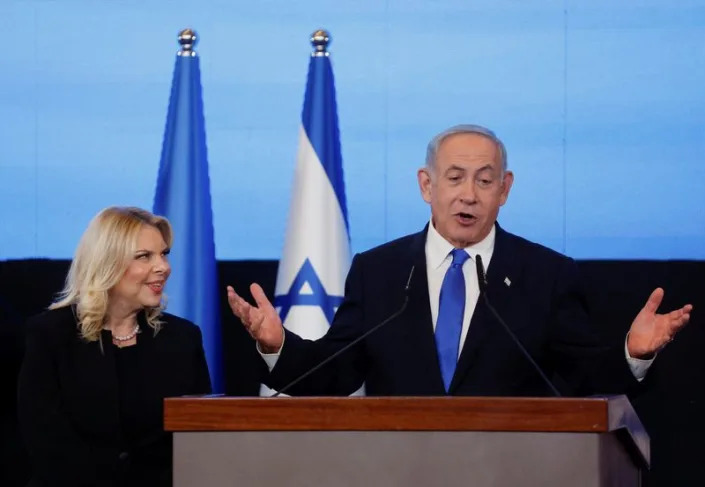

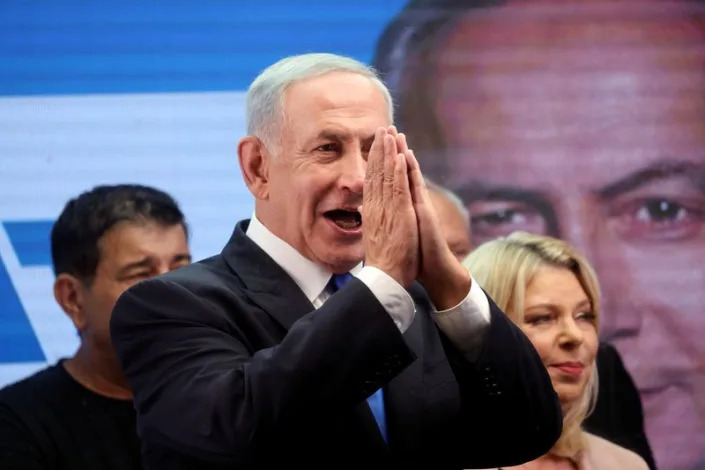
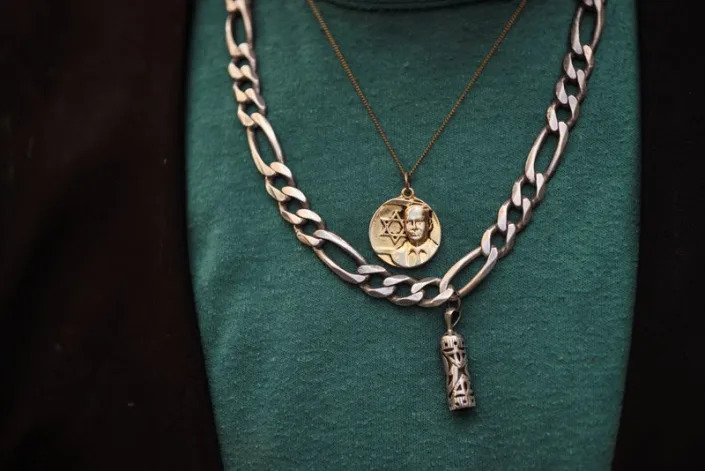
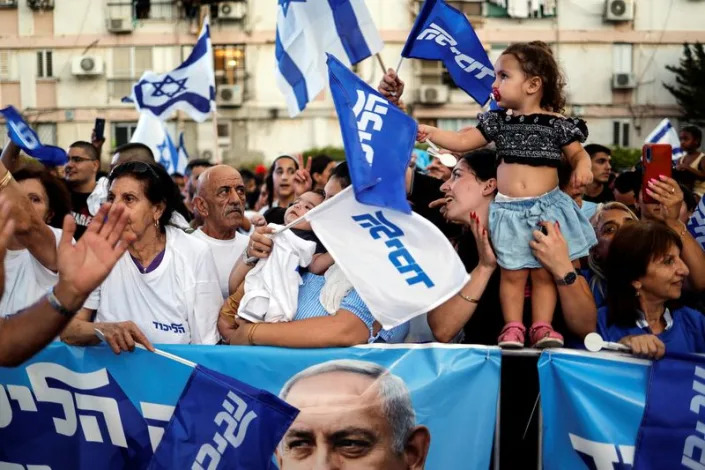
Supporters of Former Israeli Prime Minister Benjamin Netanyahu attend a local campaign event in the run up to Israel's elections
Thu, November 3, 2022
By James Mackenzie
JERUSALEM (Reuters) - Triumphant in this week's election, Benjamin Netanyahu faces a new test forming a government with an ultranationalist party whose sudden rise has many at home and allies abroad alarmed at the potential implications for Israeli democracy.
Israel's longest-serving prime minister and dominant political figure, Netanyahu, 73, is on course for a comeback a little over a year after losing an election to an unlikely coalition of right-wing, liberal and Arab parties in 2021.
This time however he has had to share the limelight with far-right leader Itamar Ben-Gvir, 46, who appears likely to take a senior role in government after the Religious Zionism bloc he co-heads became the third-largest in parliament with 14 seats.
Whereas religious parties have featured regularly in previous rightist coalitions, Religious Zionism is on course to exercise unprecedented influence, said Assaf Shapira, director of Political Reform at the Israel Democracy Institute.
"This party is a huge success, no religious party in Israel has ever achieved such a number," he said.
Supported by many outside the normal base of religious voters, the rise of Ben-Gvir, a fiery provocateur who until recently was calling for Palestinians to be expelled, reflected widespread fears over security among many Israelis.
That was especially the case following the violence that erupted in some mixed Arab and Jewish cities last year, causing a profound shock to many residents.
"People have woken up and seen that what's going on in the country cannot be ignored," said 29 year-old teacher Moria Sebbag. "Let's hope security will be restored, that's what's important to me right now."
Ben-Gvir has said he wants to become police minister but it is still unclear what Netanyahu, on trial on corruption charges which he denies, will do once he is back or what positions Ben-Gvir and his partner Bezalel Smotrich may be offered.
With the conflict with the Palestinians surging anew and touching off Jewish-Arab tensions within Israel, Ben-Gvir on Thursday tweeted: "The time has come to impose order here. The time has come for there to be a landlord." Fears have risen both in Israel and abroad that some measures talked about by the far-right - such as expelling anyone deemed "disloyal" or imposing greater constraints on the courts as Smotrich has proposed - could alter the character of Israel's democracy if they are ever implemented.
"I do think it's a shift in democratic norms," said David Makovsky, a fellow at the Washington Institute for Near East Policy. "I don't think it means it's not a democracy but it is a shift for a country that has always prided itself on the independence of its judiciary."
'TOLERANCE AND RESPECT FOR ALL'
Part of the balancing act facing Netanyahu will be ensuring that such concerns do not cause problems with allies, including the United States, where there has been little sign of enthusiasm for his new partner.
Asked about concern over dealing with Ben-Gvir, who was convicted in 2007 of racist incitement and support for Kach, a group on the Israeli and U.S. terror blacklists, a State Department spokesman declined to comment on "hypotheticals."
He said the administration hoped "all Israeli government officials will continue to share the values of an open, democratic society, including tolerance and respect for all in civil society, particularly for minority groups."
Much may also depend on the result of next week's congressional elections in the United States where Republican candidates with whom Netanyahu has long felt more comfortable may make gains at the expense of President Joe Biden's Democratic Party allies.
Some of Netanyahu's longstanding priorities are expected to continue, notably his unyielding stance against Iran and his determination that Tehran should not acquire a nuclear weapon.
He is also expected to try to continue to build on the historic achievement of his last period in office, the Abraham Accords with the United Arab Emirates and Bahrain, a potential precursor to a wider normalization with the Arab world.
Yet there is no sign of progress on the Palestinian conflict after Yair Lapid, now the caretaker prime minister, briefly revived talk of a two-state solution this year; Palestinian reaction to Netanyahu's win has been almost uniformly hostile.
Contrary to his hawkish image, Netanyahu has often taken a more flexible and pragmatic approach than some of his predecessors. But there have been fears his legal problems may push him to make concessions to the far-right in return for their support in clipping the wings of the courts.
"Netanyahu now has a personal interest in limiting the power of law authorities and the Supreme Court because of his trial," Shapira said.
Even while the campaign was under way, Smotrich proposed a set of legal changes that would cut into judicial authority and increase government control over the judiciary while potentially helping Netanyahu in his legal battles.
Lapid joined a chorus of critics denouncing the proposed changes as an attack on the rule of law and Netanyahu has been at pains to project a statesman-like image to allay fears of an anti-democratic revolution.
In a speech to supporters, Netanyahu said he would be avoiding "unnecessary adventures" and Ben-Gvir himself, who only a few days ago was brandishing a gun at Palestinian demonstrators in occupied East Jerusalem, has promised that "we represent everyone."
(Additional reporting by Emily Rose and Henriette Chacar and Matt Spetalnick in Washington; Editing by Howard Goller)
Israel election: Netanyahu on ‘verge of big victory’ as ultra-nationalist party breaks through
Emily Atkinson
Wed, November 2, 2022

(AFP via Getty Images)
Former Israeli prime minister Benjamin Netanyahu looks poised for a dramatic return to power, according to the latest exit polls, as results also pointed to Itamar Ben-Gvir’s far-right Religious Zionist party becoming the third largest in Israel’s parliament.
With around 85 per cent of the vote counted, Mr Netanyahu’s Likud party, with the help of right-wing allies including Mr Ben-Gvir looks set to secure a small majority in the 120-seat Knesset.
“We are on the verge of a very big victory,” Netanyahu, 73, told supporters at a gathering in Jerusalem on Wednesday. “I will establish a nationalist government that will see to all Israeli citizens without any exceptions.”
His longtime rival, incumbent prime minister Yair Lapid of the centrist Yesh Atid party, was predicted to win 24 seats, with his camp at 54 seats overall. The Religious Zionist party is on course to get 14 seats.
Final results are expected on Friday.
The hundreds of thousands of remaining ballots — mostly from those who voted away from their regular place of residency — have to be cross-checked for accuracy, a more time-consuming effort. They could lend a boost to Netanyahu’s opponents, reducing the size of any potential majority.
With Netanyahu and his allies projected to win more than the 61-seat majority needed to form a government, the country’s protracted political crisis may be headed toward a conclusion, though Israel remains as divided as ever as illustrated by the rise of Mr Gvir and his once-fringe party.
He was a former member of Kach, a group placed on Israeli and US terrorist watchlists.
Mr Ben Gvir is a disciple of Meir Kahane, founder of the Kach party and the Jewish Defence League (JDL). Like Mr Kahane, who was assassinated in New York in 1990 and considered a pariah, the Religious Zionist leader has espoused extreme views against those he considers disloyal to the Israeli state.
Should Mr Netanyahu fall short of a parliamentary majority, Mr Ben Gvir’s party would likely fall first in line as coalition kingmaker and seed one of the most right-wing governments in Israeli history.
At an all-male campaign gathering in Jerusalem, men wearing Jewish skullcaps and waving Israeli flags danced in celebration of the election. At the celebration, Mr Ben-Gvir’s supporters chanted “death to terrorists”.
The Religious Zinonist leader has fast become one of Israel‘s most popular politicians thanks to his frequent media appearances and calls for a harder line against Palestinians. Young ultra-Orthodox men are among his strongest supporters.
Ben-Gvir lives in the hardline West Bank settlement of Kiryat Arba and is a strong proponent of settlement construction. He has described Arab colleagues in parliament as “terrorists,” called for deporting those who are “disloyal” and recently brandished a handgun in a tense Palestinian neighborhood of Jerusalem as he called on police to shoot Palestinian stone-throwers.
“We want to make a total separation between those who are loyal to the state of Israel — and we don’t have any problem with them — and those who undermine our dear country,” he said.
Muhammad Shtayyeh, the Palestinian prime minister, described rise of Israel‘s far right as “a natural result of the growing manifestations of extremism and racism in Israeli society”.

A Palestinian man reads the headlines of a local newspaper in the occupied-West Bank city of Hebron (AFP via Getty Images)
Israelis voted in the country’s fifth election in less than four years, hoping to break the political deadlock which has paralysed the country.
Mr Netanyahu was Israel‘s longest-serving prime minister, governing for 12 consecutive years before he was ousted last year by Mr Lapid, who went on to lead an unlikely patchwork of centrist and Arab parties, which disagreed on most issues, from Israeli occupation to LGBT+ rights.
Mr Lapid, addressing supporters early Wednesday, insisted that the race was not yet over. “Until the last envelope is counted, nothing is over and nothing is final,” he said.
No comments:
Post a Comment